- Home
- Michael Swanwick
Griffin's Egg
Griffin's Egg Read online
Griffin's Egg
Michael Swanwick
Michael Swanwick
Griffin's Egg
The moon? It is a griffin's egg,
Hatching to-morrow night.
And how the little boys will watch
With shouting and delight
To see him break the shell and stretch
And creep across the sky.
The boys will laugh. The little girls,
I fear, may hide and cry ...
VACHEL LINDSAY
This book is dedicated to the Loud Philadelphians:
Tess Kissinger, Bob Walters, Susan Casper, Gardner Dozois, Marianne Porter, Mike Ford emeritus, Greg Frost, Joanne Burke, David Axler, Ray Ridenour (hon.), Tim Sullivan emeritus, and occasionally Janet and Karl Kofoed.
The sun cleared the mountains. Gunther Weil raised a hand in salute, then winced as the glare hit his eyes in the instant it took his helmet to polarize.
He was hauling fuel rods to Chatterjee Crater industrial park. The Chatterjee B reactor had gone critical forty hours before dawn, taking fifteen remotes and a microwave relay with it, and putting out a power surge that caused collateral damage to every factory in the park. Fortunately, the occasional meltdown was designed into the system. By the time the sun rose over the Rhaeticus highlands, a new reactor had been built and was ready to go online.
Gunther drove automatically, gauging his distance from Bootstrap by the amount of trash lining the Mare Vaporum road. Close by the city, discarded construction machinery and damaged assemblers sat in open-vacuum storage, awaiting possible salvage. Ten kilometers out, a pressurized van had exploded, scattering machine parts and giant worms of insulating foam across the landscape. At twenty-five kilometers, a poorly graded stretch of road had claimed any number of cargo skids and shattered running lights from passing traffic.
Forty kilometers out, though, the road was clear, a straight, clean gash in the dirt. Ignoring the voices at the back of his skull, the traffic chatter and automated safety messages that the truck routinely fed into his transceiver chip, he scrolled up the topographicals on the dash.
Right about here.
Gunther turned off the Mare Vaporum road and began laying tracks over virgin soil. "You've left your prescheduled route," the truck said. "Deviations from schedule may only be made with the recorded permission of your dispatcher."
"Yeah, well." Gunther's voice seemed loud in his helmet, the only physical sound in a babel of ghosts. He'd left the cabin unpressurized, and the insulated layers of his suit stilled even the conduction rumbling from the treads. "You and I both know that so long as I don't fall too far behind schedule, Beth Hamilton isn't going to care if I stray a little in between."
"You have exceeded this unit's linguistic capabilities."
"That's okay, don't let it bother you." Deftly he tied down the send switch on the truck radio with a twist of wire. The voices in his head abruptly died. He was completely isolated now.
"You said you wouldn't do that again." The words, broadcast directly to his trance chip, sounded as deep and resonant as the voice of God. "Generation Five policy expressly requires that all drivers maintain constant radio--"
"Don't whine. It's unattractive."
"You have exceeded this unit's linguistic--"
"Oh, shut up." Gunther ran a finger over the topographical maps, tracing the course he'd plotted the night before: Thirty kilometers over cherry soil, terrain no human or machine had ever crossed before, and then north on Murchison road. With luck he might even manage to be at Chatterjee early.
He drove into the lunar plain. Rocks sailed by to either side. Ahead, the mountains grew imperceptibly. Save for the treadmarks dwindling behind him, there was nothing from horizon to horizon to show that humanity had ever existed. The silence was perfect.
Gunther lived for moments like this. Entering that clean, desolate emptiness, he experienced a vast expansion of being, as if everything he saw, stars, plain, craters and all, were encompassed within himself. Bootstrap City was only a fading dream, a distant island on the gently rolling surface of a stone sea. Nobody will ever be first here again, he thought. Only me.
A memory floated up from his childhood. It was Christmas eve and he was in his parents' car, on the way to midnight Mass. Snow was falling, thickly and windlessly, rendering all the familiar roads of Dusseldorf clean and pure under sheets of white. His father drove, and he himself leaned over the front seat to stare ahead in fascination into this peaceful, transformed world. The silence was perfect.
He felt touched by solitude and made holy.
The truck plowed through a rainbow of soft greys, submerged hues more hints than colors, as if something bright and festive held itself hidden just beneath a coating of dust. The sun was at his shoulder, and when he spun the front axle to avoid a boulder, the truck's shadow wheeled and reached for infinity. He drove reflexively, mesmerized by the austere beauty of the passing land.
At a thought, his peecee put music on his chip. Stormy Weather filled the universe.
He was coming down a long, almost imperceptible slope when the controls went dead in his hands. The truck powered down and coasted to a stop. "Goddamn you, you asshole machine!" he snarled. "What is it this time?"
"The land ahead is impassible."
Gunther slammed a fist on the dash, making the maps dance. The land ahead was smooth and sloping, any unruly tendencies tamed eons ago by the Mare Imbrium explosion. Sissy stuff. He kicked the door open and clambered down.
The truck had been stopped by a baby rille: a snakelike depression meandering across his intended route, looking for all the world like a dry streambed. He bounded to its edge. It was fifteen meters across, and three meters down at its deepest. Just shallow enough that it wouldn't show up on the topos. Gunther returned to the cab, slamming the door noiselessly behind him.
"Look. The sides aren't very steep. I've been down worse a hundred times. We'll just take it slow and easy, okay?"
"The land ahead is impassible," the truck said. "Please return to the originally scheduled course."
Wagner was on now. Tannhauser. Impatiently, he thought it off.
"If you're so damned heuristic, then why won't you ever listen to reason?" He chewed his lip angrily, gave a quick shake of his head. "No, going back would put us way off schedule. The rille is bound to peter out in a few hundred meters. Let's just follow it until it does, then angle back to Murchison. We'll be at the park in no time."
Three hours later he finally hit the Murchison road. By then he was sweaty and smelly and his shoulders ached with tension. "Where are we?" he asked sourly. Then, before the truck could answer, "Cancel that." The soil had turned suddenly black. That would be the ejecta fantail from the Sony-Reinpfaltz mine. Their railgun was oriented almost due south in order to avoid the client factories, and so their tailings hit the road first. That meant he was getting close.
Murchison was little more than a confluence of truck treads, a dirt track crudely leveled and marked by blazes of orange paint on nearby boulders. In quick order Gunther passed through a series of landmarks: Harada Industrial fantail, Sea of Storms Macrofacturing fantail, Krupp funfzig fantail. He knew them all. G5 did the robotics for the lot.
A light flatbed carrying a shipped bulldozer sped past him, kicking up a spray of dust that fell as fast as pebbles. The remote driving it waved a spindly arm in greeting. He waved back automatically, and wondered if it was anybody he knew.
The land hereabouts was hacked and gouged, dirt and boulders shoved into careless heaps and hills, the occasional tool station or Oxytank Emergency Storage Platform chopped into a nearby bluff. A sign floated by: TOILET FLUSHING FACILITIES 1/2 KILOMETER. He made a face. Then he remembered that his radio was still off
and slipped the loop of wire from it. Time to rejoin the real world. Immediately his dispatcher's voice, harsh and staticky, was relayed to his trance chip.
"--ofabitch! Weil! Where the fuck are you?"
"I'm right here, Beth. A little late, but right where I'm supposed to be."
"Sonofa--" The recording shut off, and Hamilton's voice came on, live and mean. "You'd better have a real good explanation for this one, honey."
"Oh, you know how it is." Gunther looked away from the road, off into the dusty jade highlands. He'd like to climb up into them and never come back. Perhaps he would find caves. Perhaps there were monsters: vacuum trolls and moondragons with metabolisms slow and patient, taking centuries to move one body's-length, hyperdense beings that could swim through stone as if it were water. He pictured them diving, following lines of magnetic force deep, deep into veins of diamond and plutonium, heads back and singing. "I picked up a hitchhiker, and we kind of got involved."
"Try telling that to E. Izmailova. She's mad as hornets at you."
"Who?"
"Izmailova. She's the new demolitions jock, shipped up here on a multicorporate contract. Took a hopper in almost four hours ago, and she's been waiting for you and Siegfried ever since. I take it you've never met her?"
"No."
"Well, I have, and you'd better watch your step with her. She's exactly the kind of tough broad who won't be amused by your antics."
"Aw, come on, she's just another tech on a retainer, right? Not in my line of command. It's not like she can do anything to me."
"Dream on, babe. It wouldn't take much pull to get a fuckup like you sent down to Earth."
The sun was only a finger's breadth over the highlands by the time Chatterjee A loomed into sight. Gunther glanced at it every now and then, apprehensively. With his visor adjusted to the H-alpha wavelength, it was a blazing white sphere covered with slowly churning black specks: More granular than usual. Sunspot activity seemed high. He wondered that the Radiation Forecast Facility hadn't posted a surface advisory. The guys at the Observatory were usually right on top of things.
Chatterjee A, B and C were a triad of simple craters just below Chladni, and while the smaller two were of minimal interest, Chatterjee A was the child of a meteor that had punched through the Imbrian basalts to as sweet a vein of aluminum ore as anything in the highlands. Being so convenient to Bootstrap made it one of management's darlings, and Gunther was not surprised to see that Kerr-McGee was going all out to get their reactor online again.
The park was crawling with walkers, stalkers and assemblers. They were all over the blister-domed factories, the smelteries, loading docks and vacuum garages. Constellations of blue sparks winked on and off as major industrial constructs were dismantled. Fleets of heavily-loaded trucks fanned out into the lunar plain, churning up the dirt behind them. Fats Waller started to sing The Joint is Jumping and Gunther laughed.
He slowed to a crawl, swung wide to avoid a gas-plater that was being wrangled onto a loader, and cut up the Chatterjee B ramp road. A new landing pad had been blasted from the rock just below the lip, and a cluster of people stood about a hopper resting there. One human and eight remotes.
One of the remotes was speaking, making choppy little gestures with its arms. Several stood inert, identical as so many antique telephones, unclaimed by Earthside management but available should more advisors need to be called online.
Gunther unstrapped Siegfried from the roof of the cab and, control pad in one hand and cable spool in the other, walked him toward the hopper.
The human strode out to meet him. "You! What kept you?" E. Izmailova wore a jazzy red-and-orange Studio Volga boutique suit, in sharp contrast to his own company-issue suit with the G5 logo on the chest. He could not make out her face through the gold visor glass. But he could hear it in her voice: blazing eyes, thin lips.
"I had a flat tire." He found a good smooth chunk of rock and set down the cable spool, wriggling it to make sure it sat flush. "We got maybe five hundred yards of shielded cable. That enough for you?"
A short, tense nod.
"Okay." He unholstered his bolt gun. "Stand back." Kneeling, he anchored the spool to the rock. Then he ran a quick check of the unit's functions. "Do we know what it's like in there?"
A remote came to life, stepped forward and identified himself as Don Sakai, of G5's crisis management team. Gunther had worked with him before: a decent enough guy, but like most Canadians he had an exaggerated fear of nuclear energy. "Ms. Lang here, of Sony-Reinpfaltz, walked her unit in but the radiation was so strong she lost control after a preliminary scan." A second remote nodded confirmation, but the relay time to Toronto was just enough that Sakai missed it. "The remote just kept on walking." He coughed nervously, then added unnecessarily, "The autonomous circuits were too sensitive."
"Well, that's not going to be a problem with Siegfried. He's as dumb as a rock. On the evolutionary scale of machine intelligence he ranks closer to a crowbar than a computer." Two and a half seconds passed, and then Sakai laughed politely. Gunther nodded to Izmailova. "Walk me through this. Tell me what you want."
Izmailova stepped to his side, their suits pressing together briefly as she jacked a patch cord into his control pad. Vague shapes flickered across the outside of her visor like the shadows of dreams. "Does he know what he's doing?" she asked.
"Hey, I--"
"Shut up, Weil," Hamilton growled on a private circuit. Openly, she said, "He wouldn't be here if the company didn't have full confidence in his technical skills."
"I'm sure there's never been any question--" Sakai began. He lapsed into silence as Hamilton's words belatedly reached him.
"There's a device on the hopper," Izmailova said to Gunther. "Go pick it up."
He obeyed, reconfiguring Siegfried for a small, dense load. The unit bent low over the hopper, wrapping large, sensitive hands about the device. Gunther applied gentle pressure. Nothing happened. Heavy little bugger. Slowly, carefully, he upped the power. Siegfried straightened.
"Up the road, then down inside."
The reactor was unrecognizable, melted, twisted and folded in upon itself, a mound of slag with twisting pipes sprouting from the edges. There had been a coolant explosion early in the incident, and one wall of the crater was bright with sprayed metal. "Where is the radioactive material?" Sakai asked. Even though he was a third of a million kilometers away, he sounded tense and apprehensive.
"It's all radioactive," Izmailova said.
They waited. "I mean, you know. The fuel rods?"
"Right now, your fuel rods are probably three hundred meters down and still going. We are talking about fissionable material that has achieved critical mass. Very early in the process the rods will have all melted together in a sort of superhot puddle, capable of burning its way through rock. Picture it as a dense, heavy blob of wax, slowly working its way toward the lunar core."
"God, I love physics," Gunther said.
Izmailova's helmet turned toward him, abruptly blank. After a long pause, it switched on again and turned away. "The road down is clear at least. Take your unit all the way to the end. There's an exploratory shaft to one side there. Old one. I want to see if it's still open."
"Will the one device be enough?" Sakai asked. "To clean up the crater, I mean."
The woman's attention was fixed on Siegfried's progress. In a distracted tone she said, "Mr. Sakai, putting a chain across the access road would be enough to clean up this site. The crater walls would shield anyone working nearby from the gamma radiation, and it would take no effort at all to reroute hopper overflights so their passengers would not be exposed. Most of the biological danger of a reactor meltdown comes from alpha radiation emitted by particulate radioisotopes in the air or water. When concentrated in the body, alpha-emitters can do considerable damage; elsewhere, no. Alpha particles can be stopped by a sheet of paper. So long as you keep a reactor out of your ecosystem, it's as safe as any other large machine. Burying a destroyed reacto
r just because it is radioactive is unnecessary and, if you will forgive me for saying so, superstitious. But I don't make policy. I just blow things up."
"Is this the shaft you're looking for?" Gunther asked.
"Yes. Walk it down to the bottom. It's not far."
Gunther switched on Siegfried's chestlight, and sank a roller relay so the cable wouldn't snag. They went down. Finally Izmailova said, "Stop. That's far enough." He gently set the device down and then, at her direction, flicked the arming toggle. "That's done," Izmailova said. "Bring your unit back. I've given you an hour to put some distance between the crater and yourself." Gunther noticed that the remotes, on automatic, had already begun walking away.
"Um ... I've still got fuel rods to load."
"Not today you don't. The new reactor has been taken back apart and hauled out of the blasting zone."
Gunther thought now of all the machinery being disassembled and removed from the industrial park, and was struck for the first time by the operation's sheer extravagance of scale. Normally only the most sensitive devices were removed from a blasting area. "Wait a minute. Just what kind of monster explosive are you planning to use?"
There was a self-conscious cockiness to Izmailova's stance. "Nothing I don't know how to handle. This is a diplomat-class device, the same design as saw action five years ago. Nearly one hundred individual applications without a single mechanical failure. That makes it the most reliable weapon in the history of warfare. You should feel privileged having the chance to work with one."
Gunther felt his flesh turn to ice. "Jesus Mother of God," he said. "You had me handling a briefcase nuke."
"Better get used to it. Westinghouse Lunar is putting these little babies into mass production. We'll be cracking open mountains with them, blasting roads through the highlands, smashing apart the rille walls to see what's inside." Her voice took on a visionary tone. "And that's just the beginning. There are plans for enrichment fields in Sinus Aestum. Explode a few bombs over the regolith, then extract plutonium from the dirt. We're going to be the fuel dump for the entire solar system."

 The New Prometheus
The New Prometheus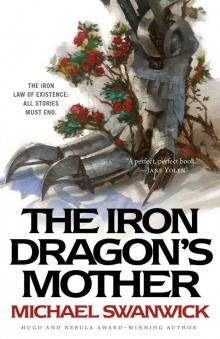 The Iron Dragon’s Mother
The Iron Dragon’s Mother The Mongolian Wizard Stories
The Mongolian Wizard Stories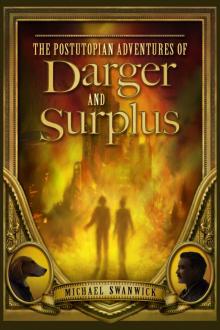 The Postutopian Adventures of Darger and Surplus
The Postutopian Adventures of Darger and Surplus Day of the Kraken
Day of the Kraken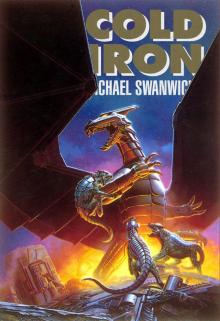 Cold Iron
Cold Iron Murder in the Spook House: A Tor.com Original
Murder in the Spook House: A Tor.com Original Radio Waves
Radio Waves The New Prometheus: A Tor.com Original
The New Prometheus: A Tor.com Original Stations of the Tide
Stations of the Tide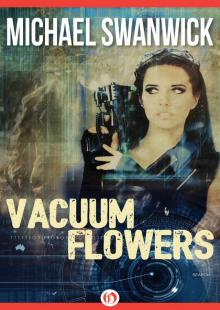 Vacuum Flowers
Vacuum Flowers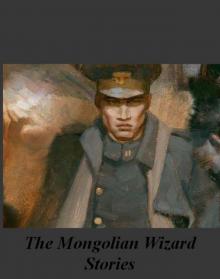 The Mongolian Wizard Stories (online stories 1-7)
The Mongolian Wizard Stories (online stories 1-7)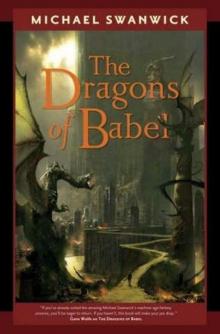 The Dragons of Babel
The Dragons of Babel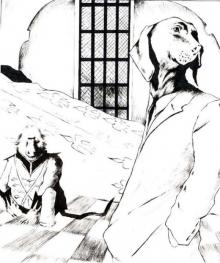 The Dog Said Bow-Wow
The Dog Said Bow-Wow Griffin's Egg
Griffin's Egg The Best of Michael Swanwick
The Best of Michael Swanwick Not So Much, Said the Cat
Not So Much, Said the Cat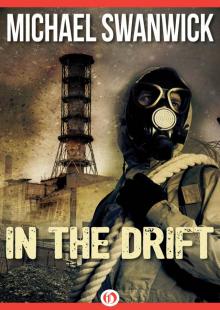 In the Drift
In the Drift Vacumn Flowers
Vacumn Flowers Slow Life
Slow Life The Wisdom Of Old Earth
The Wisdom Of Old Earth Legions In Time
Legions In Time Scherzo with Tyrannosaur
Scherzo with Tyrannosaur The Year's Best Science Fiction (2008 Edition)
The Year's Best Science Fiction (2008 Edition)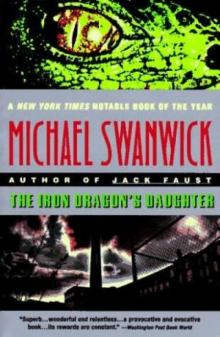 The Iron Dragon's Daughter
The Iron Dragon's Daughter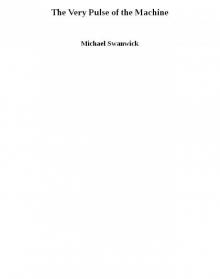 The Very Pulse of the Machine
The Very Pulse of the Machine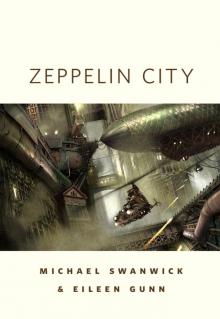 Zeppelin City
Zeppelin City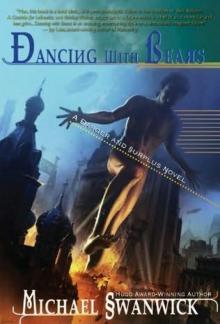 Dancing with Bears
Dancing with Bears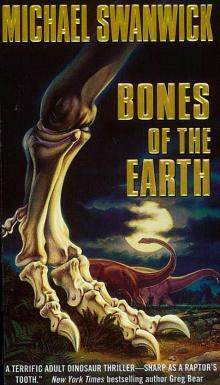 Bones of the Earth
Bones of the Earth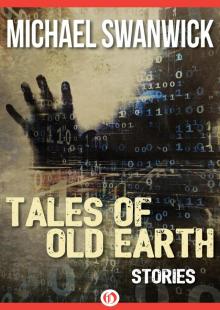 Tales of Old Earth
Tales of Old Earth Trojan Horse
Trojan Horse Radiant Doors
Radiant Doors